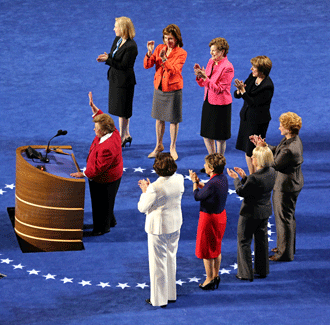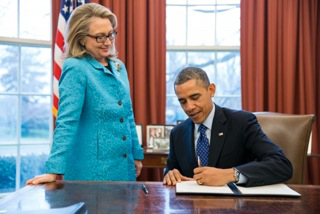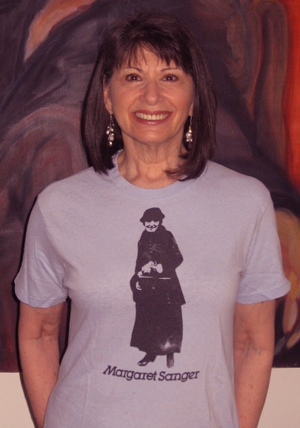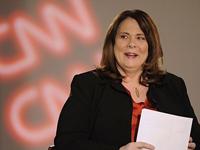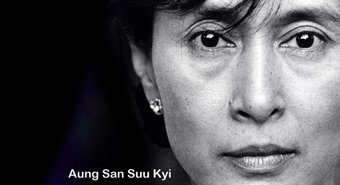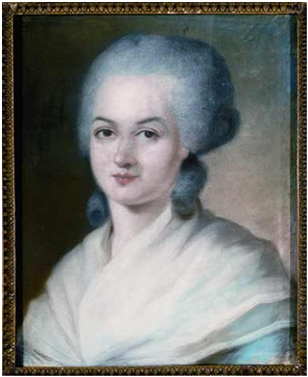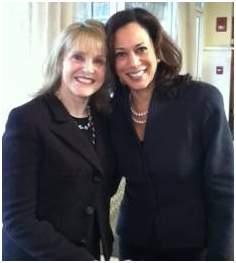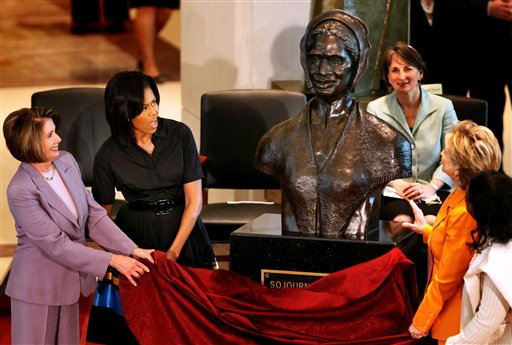Connect with Gloria!
Bring Gloria to Speak
Featured Upcoming Event
Wednesday, Oct. 2-Nov. 13, 2013 Gloria will teach a 6-week online course "9 Practical Leadership Power Tools to Advance Your Career". This is a Take The Lead event in partnership with Arizona State University Online. Participants will receive a certificate to enhance their resumes along with practical skills and understanding of power dynamics in the workplace. Don't miss this opportunity and register today!
More events here.
Buy Gloria’s Latest Book
-
-
-
Accolades

"With heartfelt encouragement ... (including strategies for including men in feminist causes), this guide is accessible to all."
~Publisher's Weekly
 "Female Writers Kicking Up Literary Dust"
"Female Writers Kicking Up Literary Dust"
~Women's e-News"Top 30 Political Mom Bloggers"
~The Stir"Gift Ideas for the Change Agents on Your List"
~Claire Mysko"Feminist Reading List"
~Deep Muck Big Rake"5 Must-Read Books for Women"
~Hello LadiesRead additional Media Buzz here.
-
Recent Posts
Recent Comments
- Gloria Feldt; An Inspiring Woman » CreativeBizHub on She’s Doing It: LisaBeth Weber Pins Pack Message Wallop
- Gloria Feldt on Stuck? Meet Jake and the Power of Letting Go to Move Forward
- Leslie on Stuck? Meet Jake and the Power of Letting Go to Move Forward
- Liz @ Creative Liberty on Sandberg: Are You Bossy or Merely Showing Leadership Skills?
- Gloria Feldt on Sandberg: Are You Bossy or Merely Showing Leadership Skills?
Categories
Listen to My Podcasts

Stacey Gualandi of The Women's Eye interviewed me about--what else--women and power.
Shelley Irwin of NPR asks me why I believe that no one is holding women back but themselves.
Suzanne Braun Levine and I discuss No Excuses on The Fiesty Side of Fifty on Blog Talk Radio.
Nicole Sanders talks to me about No Excuses on her show Radio or Not, on Progressive Talk Radio.
Dennis Lambert of KJZZ's "Morning Edition asks me why I wrote No Excuses.
Talking to Terry Hernon MacDonald about No Excuses over at Single Women Rule.
Discussing No Excuses with Joe Conason on Book Talk Radio.
Talking with Amanda Marcotte on RH Reality Check about women and power.
See Jane Do interview, encouraging women to step into positions of power and leadership – now!
Speaking with MadamaAmbi about No Excuses
Women's Relationship to Power and Leadership
PoliticsWomen’s History Month: New Hampshire’s Barrier Breaking Political Leadersby Gloria Feldt on March 20th, 2013in Create a Movement, Gender, Leadership, Politics, Power, Power Tools, She's Doing It Today’s U.S. Congress is made up of less than 20% of female members—18% to be exact—a far cry from the parity we strive toward. Any conversation about Women’s History Month must include the rather dismal representation of women in American politics across the board. The Congressional delegation from New Hampshire are the exception to that 20% barrier. Last November, two women won Congressional seats, joining the two women who already held New Hampshire’s two Senate seats. To top it all off, the state’s governor, speaker of the State House, and chief justice of the State Supreme Court are all women as well. These women have made history by making New Hampshire the first state with an all-female Congressional delegation. The senators include Jeanne Shaheen (D) and Kelly Ayotte (R). The new Representatives are Carol Shea-Porter (D) and Ann McLand Kuster (D). Let’s not forget about Gov. Maggie Hassan (D), the only female Democratic governor in 2013, state speaker Terie Norelli (D) and State Chief Justice Linda Stewart Dalianis. While this should be celebrated as a historic win for women and women’s rights, the beliefs of these women are diverse, to say the least. On one hand, there’s Carol Shea-Porter, who stands with EMILY’s List and the National Women’s Political Caucus, among other feminist organizations. And then there’s Kelly Ayotte, Read the full article...{ Comments Off on Women’s History Month: New Hampshire’s Barrier Breaking Political Leaders comments }
My 5 Fave parts of Obama’s 2013 State of the Union Addressby Gloria Feldt on February 14th, 2013in Leadership, Politics, Power The yoga class I took just before last night’s State of the Union (SOTU) address wiped me out. I fell asleep immediately afterward. Which is good because I had a chance to think overnight about the parts that resonated most with me. I’ve been tough on the president in the past, disappointed with his timidity and unwillingness to set a big bold agenda. The other good thing about writing the day after is that others have fact checked. And the de rigeur liberal critique as well as Sen. Ted Cruz’s (R-TX) really awful other-party rebuttal have been duly hashed and rehashed. With the benefit of reflection, here are my three favorite parts of the speech. Read the full article...{ Comments Off on My 5 Fave parts of Obama’s 2013 State of the Union Address comments }
She’s Doing It: Thank You Hillary Clintonby Gloria Feldt on February 1st, 2013in Inspiration, Leadership, Politics, Power, She's Doing It
U.S. DEPARTMENT OF STATE Office of the Spokesperson For Immediate Release January 31, 2013 2013/0102 STATEMENT BY SECRETARY CLINTON Presidential Memorandum on Promoting Gender Equality and Empowering Women and Girls Globally Read the full article...{ 1 comments }
Margaret and I Did It: My Interview with Sanger Papers Projectby Gloria Feldt on November 14th, 2012in Leadership, Politics, Power, She's Doing It
Gloria Feldt: I relate to the hardships of young parents. I have been driven by a passion that my daughters and all future generations of women should have the information, aspiration, and access to birth control and abortion services that give them the ability to determine the course of their own lives. Like Margaret Sanger, I believe biology should not be destiny and no woman can call herself free till she can own and control her own body. The birth control pill represented that liberation for me. It enabled me to start college and build a career. And to become financially independent–economic justice is the second factor, after reproductive rights, women must have to be full and equal citizens, but you can’t have that unless you can make your own sexual and childbearing decisions. Read the full article...{ Comments Off on Margaret and I Did It: My Interview with Sanger Papers Project comments }
She’s Doing It: 5 Things Candy Crowley and Helen Gurley Brown Have in Common – and One Thing They Couldn’tby Gloria Feldt on August 15th, 2012in Gender, Leadership, No Excuses, Politics, Power Tools Aside from Vice Presidential candidate Paul Ryan’s frighteningly extreme position on Medicare, the top news this week has been all women all the time.
On Monday, August 13, the Commission on Presidential Debates announced that for the first time since Carole Simpson in 1992, a woman—CNN’s “State of the Union” host and chief political correspondent Candy Crowley—will moderate a presidential debate. Crowley, 61, has won many awards for political reporting during stellar career. She graduated from Randolph-Macon Woman’s College—my friend Amy Litzenberger is sure that women find their voices in all-female college settings—and rose from a Washington DC radio newsroom assistant through the Associated Press and NBC ranks before joining CNN news in 1987. Along the way, she covered every presidential campaign and convention since Jimmy Carter. On the same day Crowley’s selection was announced, Cosmopolitan Magazine’s iconic former editor-in-chief and the author of the 1962 game-changing best seller Sex and the Single Girl, Helen Gurley Brown, died in Manhattan at age 90. { Comments Off on She’s Doing It: 5 Things Candy Crowley and Helen Gurley Brown Have in Common – and One Thing They Couldn’t comments }
What Do Boomers Want? Here’s Boomer, Babe, and No Excusesby Gloria Feldt on April 10th, 2012in Inspiration, Leadership, No Excuses, Politics, Power Tools
Youngtown being a euphemism for older folks, which Baby Boomers are quickly becoming in the millions—a very important segment of America. It was great to talk with Pete and Debra who are “Boomer and the Babe” Listen to the interview right here and chime in with your thoughts in comments. Open the podcast in a separate window here or listen now by clicking the PLAY arrow above. Read the full article...{ Comments Off on What Do Boomers Want? Here’s Boomer, Babe, and No Excuses comments }
Aung San Suu Kyi Says Value Change Over Regime Changeby Catherine Engh on March 16th, 2012in 9 Ways Blog, Embrace Controversy, Gender, Leadership, Politics
As a contemporary figure making women’s history, Daw Aung San Suu Kyi reflects the kind of ‘power-to’ leadership which is truly earth shattering. “Regime change can be temporary,” she says, “but value change is a long-term business. We want the values in our country to be changed. “ Winner of the Nobel Peace Prize in 1991 Daw Aung San Suu Kyi is the leading pro-democracy opposition leader in Myanmar, formerly known as Burma, one of the world’s most isolated and repressive nations. Since a military junta grabbed power of the country in 1962, it has secured its power by rigging elections and suppressing opposition. Ms. Aung San Suu Kyi spent 15 of the last 20 years under house arrest after her party, the National League for Democracy, won an overwhelming victory in the 1990 elections but was denied power. In November 2010 elections, Myanmar’s main military-backed party won in a vote again engineered to assure the military’s continued grip on power. The National League of Democracy boycotted this election and called it what it was—undemocratic. Ms. Aung San Suu Kyi—who was released from house-arrest November of 2010—and her party, the National League for Democracy, have chosen to participate in elections this time around. On April 1 of this year, Suu Kyi and other pro-democratic candidates will run for 47 of the 48 open seats in Parliament. Her campaign speech, which will appear on National TV, will mark the first time the Nobel Peace laureate has been given the opportunity to use state media to promote her party’s platform. She calls for amending the 2008 constitution, Read the full article...{ Comments Off on Aung San Suu Kyi Says Value Change Over Regime Change comments }
From Olympe de Gouges to Women Demanding Rights Worldwideby Catherine Engh on March 15th, 2012in 9 Ways Blog, Create a Movement, Gender, Inspiration, Leadership, No Excuses, Politics
Olympe de Gouges was an 18th Century French playwright and political activist way ahead of her time, and her feminist and abolitionist writings stirred political discourse in ways that presaged uprisings by women around the world last week. Disenchanted when equal rights were not extended to women after the outbreak of the French Revolution, Olympe de Gouges wrote a Declaration of the Rights of Woman and the Female Citizen. Modeled on the 1789 Declaration of the Rights of Man and of the Citizen by the National Assembly, De Gouges’ Declaration echoed the same language, replacing ‘Man’ with ‘Woman’.
{ Comments Off on From Olympe de Gouges to Women Demanding Rights Worldwide comments }
She’s Doing It: Philactivist Barbara Lee Sparks Power of Intentionby Gloria Feldt on March 7th, 2012in 9 Ways Blog, Create a Movement, Leadership, No Excuses, Politics, She's Doing It
Barbara Lee pictured with California Attorney General Kamala Harris Gloria Feldt: In No Excuses, I asked, “When did you know you had the power to_____?” What have you learned about your power to _____ during the past year or so? Going to Girl Scout camp at age 12 was my first time away from home. I vividly recall the sound and smell of fresh pine needles crunching under my feet as I gathered twigs to build a fire to earn my campfire badge. I remember rubbing two sticks together for what seemed like forever and with each spark I learned more and more about the power of intention. I was determined to start that fire. It was the first step for me in knowing my own power. Ever since I have kindled my belief in myself and have used the power of intention to make the world a better place for women. Barbara Lee: Was there a moment when you felt very powerful recently? If so, please describe the circumstances, what you did, and why you were aware of your power. Was there a moment when you felt powerless recently? If so, please describe the circumstances, what you did, and why you felt your lack of power. Read the full article...{ Comments Off on She’s Doing It: Philactivist Barbara Lee Sparks Power of Intention comments }
We’ve Come a Long Way, Maybe: Women’s History Creates the Futureby Gloria Feldt on March 1st, 2012in 9 Ways Blog, Embrace Controversy, Gender, Inspiration, Know Your History, Leadership, Politics
Truth’s admonition seems archaic now. Why are we still “talking about it?” Is women’s history of struggle for equal rights relevant in a world where women have outpaced men in earning college degrees, equaled their numbers in the workplace, and snatched the family purse to make 85% of consumer purchases? Since “The End of Men” has been declared and women dubbed “Mistresses of the Universe” shouldn’t young women today, at least those in the industrialized world, feel powerful enough to be and do anything they want? And shouldn’t more sympathy go to men these days, as the current efforts to gain acceptance for a men’s rights movement have suggested? Read the full article...{ 3 comments }
|

